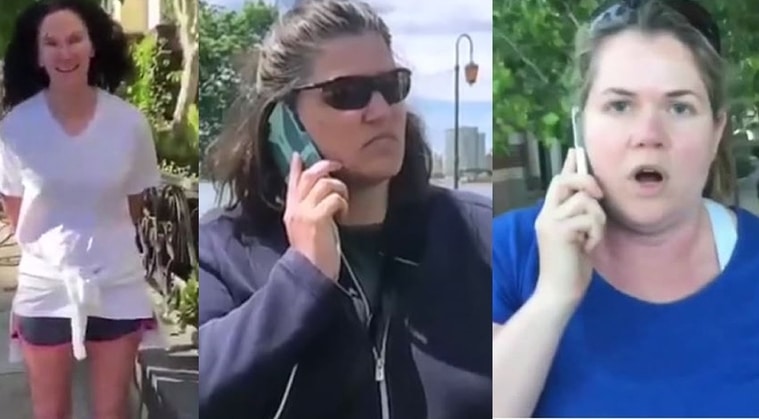The History of ‘Karen’ As She Calls the Manager and the Police

- Funny
- Offensive
Karens On Call
July 10th, 2020 – Forget the competition for Most Popular Baby Name of 2020. The name of 2020 belongs to Karen. Or, as she’s known online, #Karen. You’ve seen her on Instagram, Twitter, TikTok, YouTube, in the “wild” or even in your own home. While this pejorative term for a middle-aged white woman who is easily aggrieved and quick to use her privilege isn’t new, it has taken on a new life in the wake of a renewed Civil Rights movement.
Internet sleuths have become top of their class when trying to track down the real name of a “Karen” once her video has gone viral. What’s more difficult to do, however, is find the true origin story of the Karen meme.
Some people tie the simply “annoying/May I speak to your manager” version of Karen to a Dane Cook bit from 2005.
“Every group has a Karen and she is always a bag of douche,” Cook jokes. “And when she’s not around, you just look at each other and say, ‘God, Karen, she’s such a douchebag!'”
The mid 2000s also gave us the Karen haircut in the form of Kate Gosselin from reality TV fame. The Rachel, The Karen: these cuts took on a life of their own. You could scroll Tumblr for hours laughing at “starter pack” Karen memes. You could join over 700,000 people in the subreddit r/FuckYouKaren discussing their own personal interactions. And when October rolled around, you could go as Karen for Halloween.

This year I went with the scariest Halloween costume of them all: a Karen.
— Sierra Schultzzie (@Schultzzie) November 1, 2019
“can I speak to your manager?” pic.twitter.com/BShLaTIEth
Over the years, however, funny pictures and standup bits turned into something more serious as more and more problematic (at best) and dangerous (at worst) incidents started to be documented on cell phones and then shared widely online.
Although “Karen” has received top billing, other nicknames have been substituted at times to call out white women exerting themselves in situations where they think police need to be called on Black people doing, well, anything. “Permit Patty,” “Barbecue Becky,” and “Cornerstore Caroline” have all seen their actual name take a backseat once they were caught on camera playing both victim and authority figure.
As a shaming society, we find ourselves returning to “Karen” and, most recently, two white women have highlighted the Karen routine as a microaggression that quickly turn into a macro/systemic racial problem.
In May, Amy Cooper was caught on video calling 911 on a Black man who asked her to follow a Central Park ordinance to leash her dog. She is heard exaggerating her panic and saying that an “African American” man is threatening her. Earlier this week, a Manhattan district attorney announced plans to prosecute Cooper for falsely reporting an incident.
In the weeks following the Central Park call and the murder of George Floyd by a Minneapolis police officer, a white woman and her husband also went viral for telling a man (who identified himself as a person of color) that he was defacing someone else’s property while stenciling “Black Lives Matter” on his own front yard.
The woman, Lisa Alexander, later apologized saying “When I watch the video I am shocked and sad that I behaved the way I did. It was disrespectful to Mr. Juanillo and I am deeply sorry for that.”
Her husband didn’t get nearly as much media attention. And while there have been some “Chad” and “Kyle” shamings, the dragging usually tends to be against white women. This has caused some people to label the “Karen” trope as sexist with a handful of people considering it a slur on point with “the n-word.”
Hadley Freeman of The Guardian believes most people aren’t really arguing that it’s a slur but she does agree that using “Karen” is “sexist, ageist and classist.”
“Do I really need to spell out the sexism of a meme about a woman’s name that took off from a man griping about his ex-wife and has become a way of telling women to shut up? Yes, there are memes about Chad and Zach, but these have never gained the popularity of ones about Becky, Susan or Tammy, let alone Karen,” she writes. “When I see young (and not so young) white women defending the Karen meme, I’m reminded of the Cool Girl passage in Gone Girl: yeah, I’m not a basic pushy-mum-type woman – I’m a cool girl. Mmm, let’s see how long denigrating your own sex works for you, ladies.”
Other people think that our society can understand what “Karen” means on a more nuanced level. Less concerned with misogyny, some believe using the term actually allows people to remain somewhat anonymous and for their harmful actions to be treated with more jovial gloves.
Journalist David Dennis Jr. has been writing and warning about the danger of assigning funny nicknames to white women asserting their privilege in everyday situations.
“Giving them nicknames is providing aliases that cover the names of real women with real racist motivations to commit real harm to real Black people,” he wrote in 2018. “America has functioned under the premise that white women are innately innocent and harmless in the history of anti-Black violence despite overwhelming historical and present-day evidence to the contrary. Guarding women with nicknames and comedy will surely embarrass them in the short-term, and, in the case of Ettel, she stepped down from her post as a CEO. But do you think she has gone un-hired since? What true recourse has she seen? What true contrition has she been forced to show? Whatever you do, leave the cute nicknames for situations that are actually funny, because there’s never any comedy involved when Black boys and girls get police called on them.”
